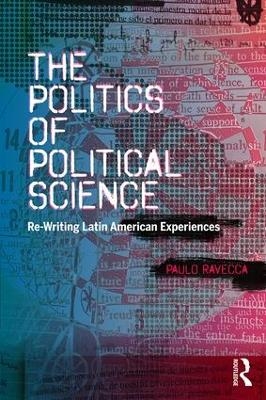
The Politics of Political Science
Routledge (Verlag)
978-0-8153-6308-8 (ISBN)
Focusing mainly on the cases of Chile and Uruguay, Ravecca employs different strands of critical theory to challenge the mainstream narrative about the development of the discipline in the region, emphasizing its ideological aspects and demonstrating how the discipline itself has been shaped by power relations. Ravecca metaphorically charts the (non-linear) transit from “cold” to “warm” to “hot” intellectual temperatures to illustrate his—alternative—narrative. Beginning with a detailed quantitative study of three regional academic journals, moving to the analysis of the role of subjectivity (and political trauma) in academia and its discourse in relation to the dictatorships in Chile and Uruguay, and arriving finally at an intimate meditation on the experience of being a queer scholar in the Latin American academy of the 21st century, Ravecca guides his readers through differing explorations, languages, and methods.
The Politics of Political Science: Re-Writing Latin American Experiences offers an essential reflection on both the relationship between knowledges and politics and the political and ethical role of the scholar today, demonstrating how the study of the politics of knowledge deepens our understanding of the politics of our times.
Paulo Ravecca is Assistant Professor in the Department of Political Science at the Universidad de la República, Uruguay, where he researches epistemology and the history of political science; critical theories (queer, neo-marxist, postcolonial, and poststructural approaches); political economy and international relations; and gender and sexuality. He is an associate editor of the Journal of Narrative Politics and Crítica Contemporánea. Revista de Teoría Política. He holds a PhD in Political Science from York University.
Introduction: The Politics of Political Science in Latin America Chapter 1 – Power, Knowledge, and Complex Relationality: Theory and Method Chapter 2 – When Political Science was Authoritarian: Chile 1979-1989 (COLD) Chapter 3 – From Revolution to Transition: The Making of a Conformist Academia in Uruguay and Beyond (?) (WARM) Chapter 4 – Doing Research, from Fortress to Intimacy (HOT) Chapter 5 – The Temperatures of Thinking and Politics: An Assemblage of Critical Theories and a Problematizing Re-Inscription of Political Science
| Erscheinungsdatum | 28.01.2019 |
|---|---|
| Zusatzinfo | 8 Tables, black and white |
| Verlagsort | New York |
| Sprache | englisch |
| Maße | 152 x 229 mm |
| Gewicht | 408 g |
| Themenwelt | Geisteswissenschaften ► Geschichte ► Regional- / Ländergeschichte |
| Sozialwissenschaften ► Ethnologie | |
| Sozialwissenschaften ► Politik / Verwaltung ► Politische Theorie | |
| Sozialwissenschaften ► Soziologie | |
| ISBN-10 | 0-8153-6308-7 / 0815363087 |
| ISBN-13 | 978-0-8153-6308-8 / 9780815363088 |
| Zustand | Neuware |
| Haben Sie eine Frage zum Produkt? |
aus dem Bereich


